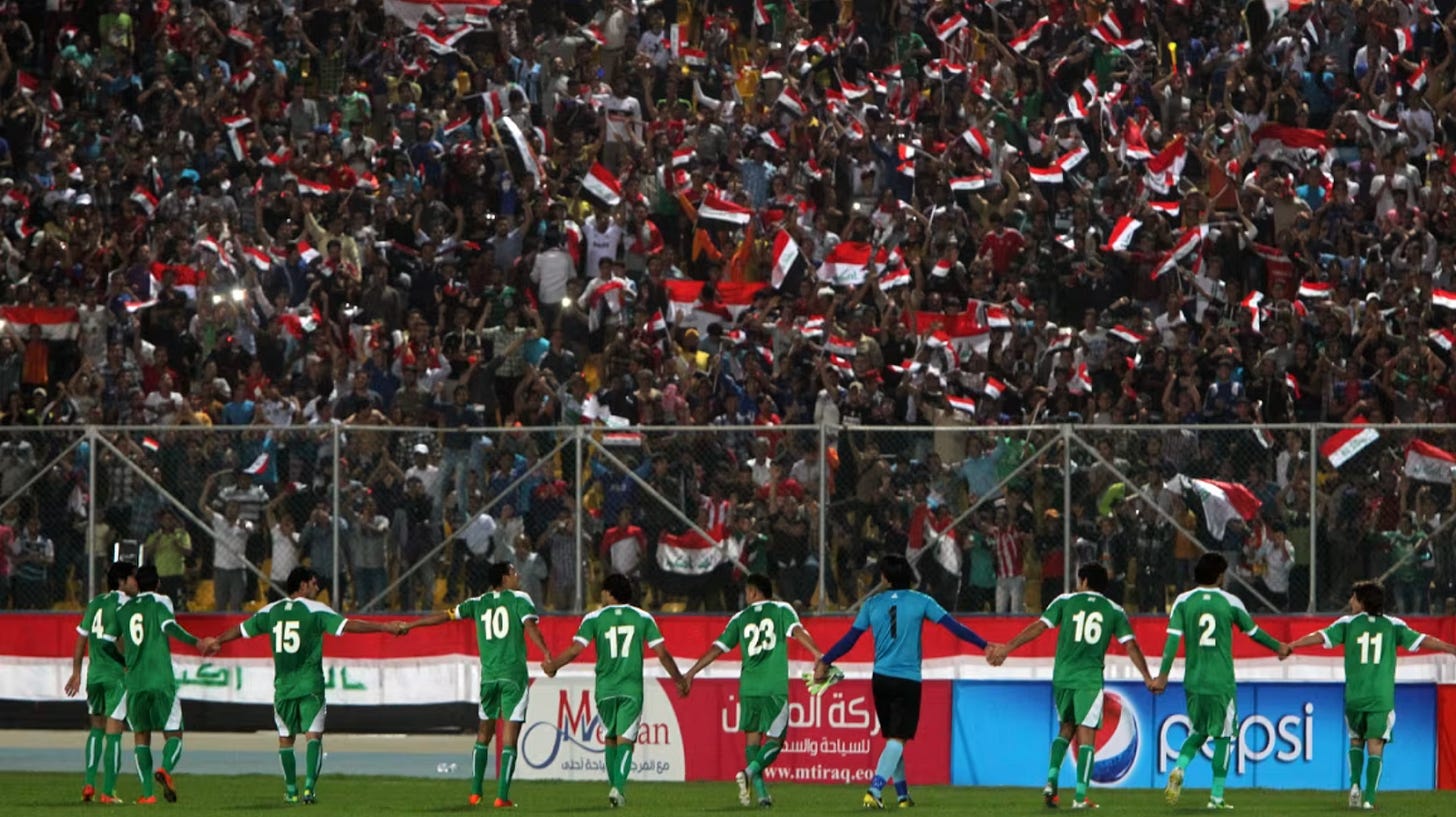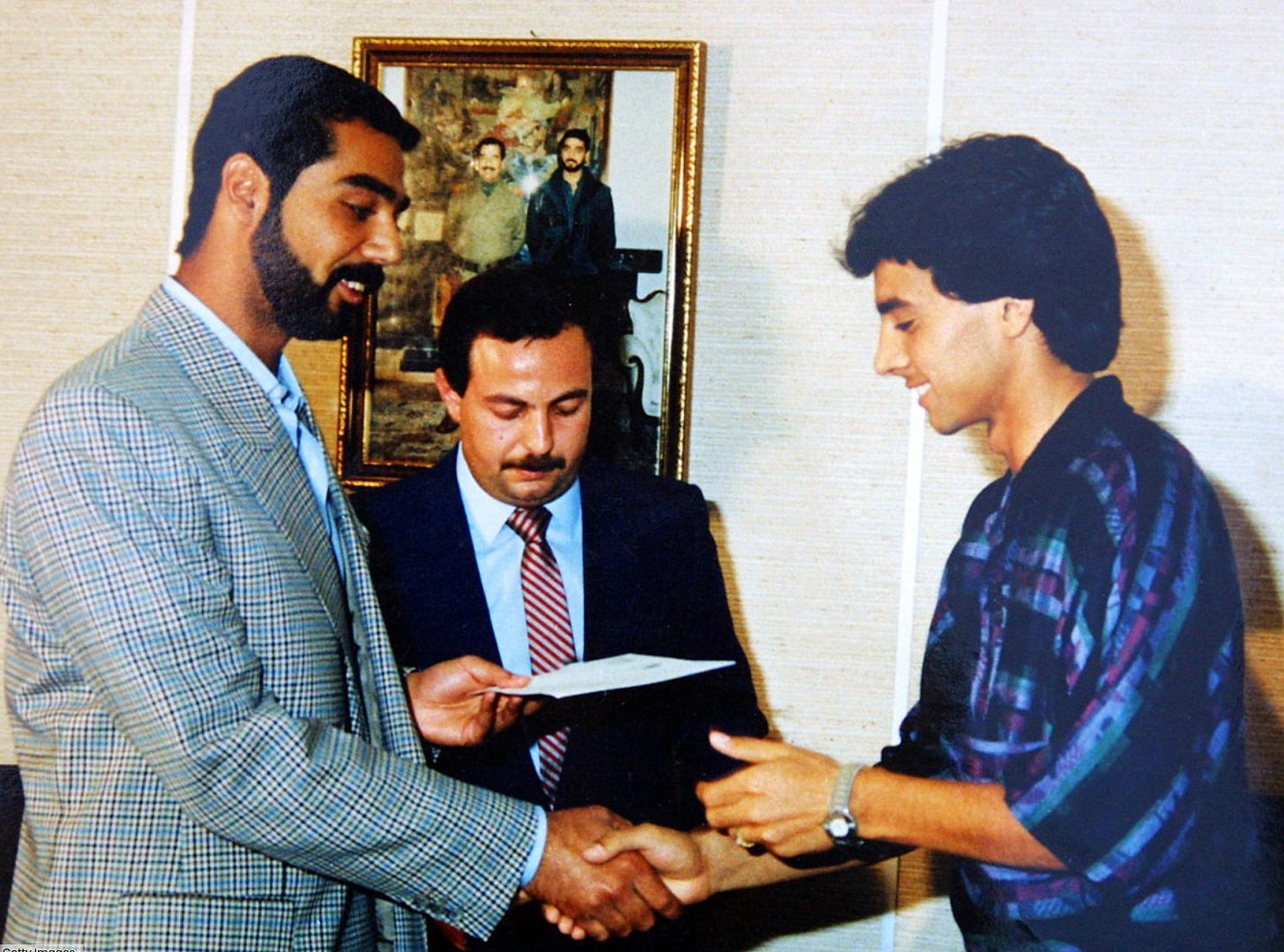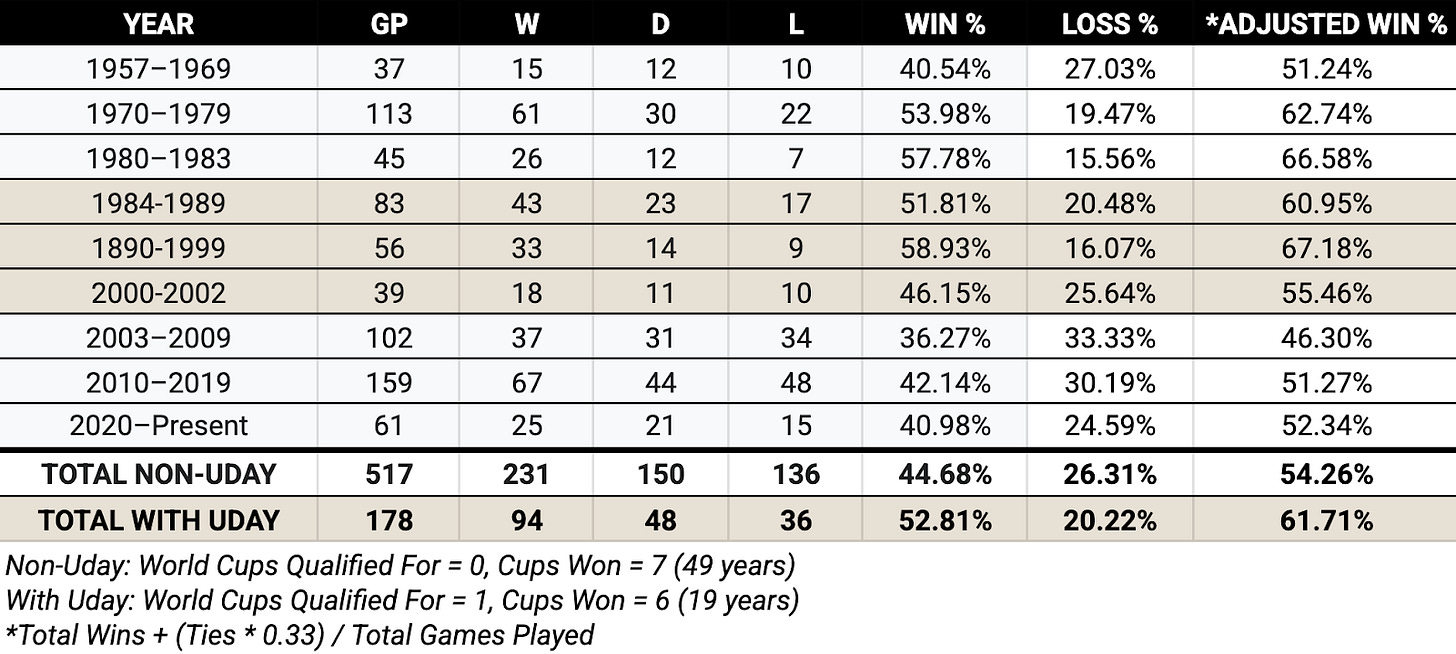Soccer in Saddam Hussein’s Iraq
How his son turned a game into a nightmare
It is estimated that there are over 3.5 billion soccer fans worldwide. Soccer fans around the world are driven by a deep, almost tribal passion that transcends the sport itself. It's about identity, community, and belonging.
The intensity of soccer fans can seem foreign to many. But think about it this way. Imagine you have only one sports team to root for and a single professional sport in your city or town. Now imagine you were born with a soccer ball at your feet and the only time you saw your family show emotion was when watching your favorite team play.
Your grandpa has a tattoo of his team’s crest. Your cousin was a ballboy for the club as a kid. Your aunt opened up a bar named after a section of bleachers in the stadium. Soccer is an heirloom passed through the generations. It’s a shared heartbeat where everyone in the town is connected to the pulse.
Now extrapolate that to a country. That is international soccer. With soccer being the very fabric of a town or country, it is easy to see how lines can be blurred between real life and a game.
We just had a match between Albania and Serbia this past weekend, which reminded us of the infamous drone moment, which Gëzim Qadraku wrote so eloquently about.
That incident over 10 years ago is a reminder of how close to home a game can be for fans and how it can boil over into political and societal issues. Such is also the case for the Iraqi national team under the reign of Saddam Hussein.
Uday Hussein
Most already know Saddam Hussein. He was an Iraqi politician who served as Iraq’s fifth president from 1979 until 2003 when the US invaded Iraq. He was known for purging political rivals and starting wars. Human Rights Watch estimated that during Saddam’s rule, he was responsible for between 250,000 - 290,000 murdered or missing Iraqis.
Most don’t know about Hussein’s oldest son, Uday. In the early 1980s, Iraq was at war with Iran. Thousands of Iraqis were being killed, which demoralized the country. To improve morale and bring pride to a broken country, Hussein appointed his son, Uday, to be the chairman of the Iraqi Olympic Committee and the Iraq Football Association.
So Uday, a new college graduate, took the reins and did everything in his power to prove to his father that he could follow in his footsteps. What followed was the culmination of soccer fandom, power, and pure evil. Said Uday’s body double years later, “The word that defines him is sadistic. I think Saddam Hussein was more human than Uday.”
Uday's Punishments
Uday used fear and punishment to try and motivate the players. His most subdued method was giving the dressing room a call before matches or during halftime to shout threats at the players. He would hit players in front of their teammates and shave players’ heads and eyebrows if they didn’t perform up to his standard.
He meticulously tracked missed shots or bad passes. If a player received enough strikes, they would be forced to participate in 12-hour long training sessions, which included using concrete balls. There are also reports that he chained players to walls in contorted positions for days at a time. He would drag players on pavement until their backs were bloodied, and then dunk them in sewage to ensure their wounds would become infected. Whipping the soles of players’ bare feet was a regular occurrence.
Uday would throw players in prison for days or months at a time if they performed poorly. It wasn’t uncommon for players to bring pillows to the games and on team buses in case they were sent directly to prison. Abbas Rahim Zair, a former Iraqi national team player, once missed a penalty shot. He was blindfolded and taken to a prison camp for three weeks.
Yasser Abdul Latif, a former captain of the team, once received a red card. He was confined to a two-square-meter cell and forced to do push-ups in two-hour increments while being flogged with cables by guards. When he was released, he wasn’t able to sleep on his back for a month.
Said Latif, “Really, Iraq was a big jail. But I never had any choice. They threatened me. If I didn’t participate on the team, they said they would beat me again and again, and consider me an enemy of the regime, and that would mean death.”
In 1997, FIFA investigated reports that members of the national team were imprisoned after losing a World Cup qualifying match to Kazakhstan. Later, players described the elaborate preparations that took place to hide any wrongdoing, which included removing players from being examined who still had scars from recent torture. In the end, FIFA found no evidence of beating and imprisonment after interviewing and examining 12 players.
It has been reported by the Olympic Council that Uday is responsible for killing more than 50 Iraqi athletes and sports figures. Some former athletes say Uday went to such extreme and vile lows to try and motivate the athletes to play better. Others say he did it just for fun.
It seems likely that Uday's deranged upbringing had something to do with his behavior. It is said that Uday played with disarmed grenades as an infant. At the age of 10, he would accompany his father, Saddam, to witness executions. In high school, he bragged about murdering his teacher for disrespecting him in front of his girlfriend. The example and influence of Uday’s father obviously impacted the way he ran his sports organizations.
Team Performance Under Uday
There wasn’t an emotionally safe place to be as an athlete during Uday’s reign.
“Football in the Uday era was a scary and terrifying time not devoid of negative psychological pressure on all the players and athletes,” said a former Iraqi player. “We used to be on the receiving end of humiliating and degrading punishments if we lose, and that massively affected the performances of the players in most tournaments that we participated in.”
However, what is mind-boggling is how well the national team performed under these circumstances. In fact, the team has never performed better than when Uday was in charge.
During the 19 years Uday was in control of the Iraqi national team, they had an overall adjusted win percentage of 61.71%, which is my way of awarding a third of a win for ties. Outside of the Uday era, the team’s adjusted win percentage is 54.26%. Now, the early 2000s were certainly chaotic with the US invasion of Iraq in 2003. You would expect its soccer team to suffer accordingly for years.
However, Iraq has also won almost as many trophies (6) under Uday as the rest of its team history (7). And it has qualified for one World Cup under Uday compared to never qualifying when he wasn’t in charge. This all happened when Iraq was banned from participating in any major tournaments in the 1990s because of the Gulf War, which Saddam Hussein started.
We obviously aren’t condoning any of the atrocities Uday committed under the guise of motivating his players. However, the Hussein’s probably cared about sports more than any other politician in Iraq’s history (albeit they went about it the wrong way).
Still, much of the differences in era performance likely has to do with the fact that Iraq’s ‘Golden Generation’ played at the same time as Uday’s rule. As mentioned previously, many players have said they feel they would have performed even better if Uday’s threats weren’t constantly on their mind.
Looking Forward
The Hussein era still looms over the country. Like any normal person whose life is destabilized by war and conflict, there will be some longing for past days, even if those past days involve the risk of being targeted by a regime that committed crimes against humanity. I’m sure some Iraqi soccer fans feel similarly.
Many of Iraq’s current players don’t remember a time under Hussein’s rule. Just over 20 years removed from the Uday era, Iraq’s national team is trying to rebuild. Most of its players still play domestically or elsewhere in the Middle East. While they haven’t won as consistently as in years past, there is hope for the upcoming World Cup. With the expanded field in 2026, Iraq still has a chance to qualify after securing an Asian Football Confederation playoff spot this week.
Graham Arnold, the former Australia head coach, was just appointed as Iraq’s new coach. The aspiration is that he gets them into the World Cup. Then anything is possible.
We can all agree, we’d like to see Iraq perform without the oppressive hand of Uday hiding in the backdrop. We should just be happy that in Iraq, it’s about soccer, again. In this case, let’s keep politics and sports separate.







What a piece, Austin!
Had no clue about this story.
Thank you for mentioning my article, but most of all for writing this article.
Enjoyed it a lot!